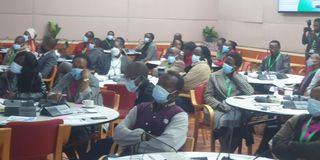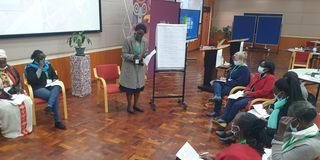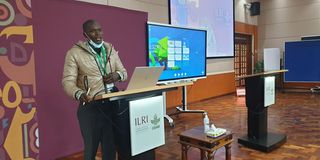Premium
Stakeholders seek to help vulnerable groups in agribusiness

Dr Rahma Adam, a gender scientist, addressing the participants during a workshop at ILRI that discussed challenges that face vulnerable groups in agribusiness.
Stakeholders in the agriculture sector are seeking solutions to challenges that face vulnerable groups in the agri-food systems.
These groups include women, youth and disabled people, who often face barriers such as access to agricultural inputs and low uptake of best farm practices and technologies.
They also have limited access to resources including finances and low market integration while the disabled barely have technologies tailor-made for them.
Last week, stakeholders met at the International Livestock Research Institute (ILRI) to discuss and map opportunities and challenges facing these groups.

Participants during the workshop at ILRI that discussed challenges facing vulnerable groups in agribusiness.
Gender equality and social inclusion
The event brought together farmers, government representatives, development partners and the private sector and others. They sought to form a gender equality and social inclusion network and a digital platform.
It is the brainchild of different organisations, including ILRI, World Fish, International Food Policy Research Institute, International Maize and Wheat Improvement Centre and the International Institute of Tropical Agriculture.
In a three-year programme called Ukama Ustawi, stakeholders are looking into diversifying and sustainably intensifying maize-based farming systems.
“We are also looking at de-risking and digitalising the production systems, supporting and accelerating value chain agribusiness,” said Dr Rahma Adam, a gender scientist with World Fish.
Value chain support
Also of focus is value chain support and a suitable policy environment for gender mainstreaming and inclusion of vulnerable groups.
Ms Mary Ngatia, a farmer from Othaya, Nyeri County, who spoke during the one-day meeting, decried gender discrimination, especially in the tea sector.
While women are primarily the labourers in this value chain, they barely get any income as farms and bank accounts are registered in their husbands’ names.
“If you check on many women from tea-growing areas, all they have in return for their intensive labour are cracked fingers as the income goes to men,” Ms Ngatia said.
Another participant recalled going to look at leased land, only for the landlord to prefer speaking to her driver and ignoring the ‘woman’.

Participants during the workshop at ILRI engage in a group discussion.
Barred from speaking in English, Kiswahili
As an extension officer, she said, she was once barred from speaking in either English or Kiswahili as it was against the culture of the people she was addressing for women to use these languages in the presence of men. Such women, she noted, were viewed as ‘spoilt’.
“It is imperative that as we move towards transformative and sustainable agribusiness solutions Kenya continually designs policies and processes with gender equality and social inclusion in mind,” said Ms Margaret Gatonye, a former CEO of the Aquaculture Association of Kenya, who was an organiser of the workshop.
While women contribute the highest labour, she added, they barely reap the benefits and often lack opportunities to play a role in shaping the policies that mostly affect them.
Challenges facing young people
Mr Fred Odhiambo, a youth trainer who also grows spices, said most young people in rural areas face challenges such as lack of ample knowledge and access to land.
They also lack market linkages and, therefore, relevant authorities, organisations and institutions should give attention to policies and dialogues addressing their issues, he added.
To find sustainable solutions to these and other challenges, Mr Odhiambo noted, there is a need to create awareness on gender issues among the youth.
He also urged young people, including those who graduate from colleges with agriculture-related certificates, to improve their practical agricultural skills.

Fred Odhiambo, a spices farmer and a youth trainer, speaking to participants during the workshop at ILRI.
Food security research
Young people said they want to be included in research about agriculture and food security, saying they need to influence current and future generations.
“As a youth myself, I urge other young people to take up opportunities such as research in agribusiness as time is ripe for us,” said Ms Lucy Njogu, a gender equality, social inclusion and market analyst at World Fish.
Ms Harriet Mawia, an agricultural economist and a gender specialist, called for the inclusion of young people in policy formulation, saying this would ensure a favourable environment for them.





